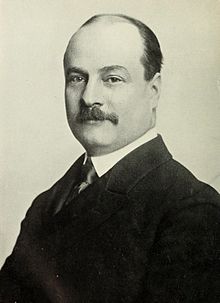Nicholas M. Butler
| Nicholas Murray Butler | |
|---|---|

Portrait of Nicholas Murray Butler, by Hollinger
|
|
| 12th President of Columbia University | |
|
In office 1902–1945 |
|
| Preceded by | Seth Low |
| Succeeded by | Frank D. Fackenthal (acting) |
| Personal details | |
| Born | April 2, 1862 Elizabeth, New Jersey |
| Died | December 7, 1947 (aged 85) New York City |
| Political party | Republican |
| Spouse(s) | Susanna Edwards Schuyler, Kate La Montagne |
| Profession | Educator, diplomat, politician |
| Signature |  |
Nicholas Murray Butler (April 2, 1862 – December 7, 1947) was an American philosopher, diplomat, and educator. Butler was president of Columbia University, president of the Carnegie Endowment for International Peace, and a recipient of the Nobel Peace Prize. He became so well known and respected that The New York Times printed his Christmas greeting to the nation every year.
Butler was born in Elizabeth, New Jersey to Mary Butler and manufacturing worker Henry Butler. He enrolled in Columbia College (later Columbia University) and joined the Peithologian Society. He earned his bachelor of arts degree in 1882, his master's degree in 1883 and his doctorate in 1884. Butler's academic and other achievements led Theodore Roosevelt to call him "Nicholas Miraculous." In 1885, Butler studied in Paris and Berlin and became a lifelong friend of future Secretary of State Elihu Root. Through Root he also met Roosevelt and William Howard Taft. In the fall of 1885, Butler joined the staff of Columbia's philosophy department.
In 1887, he co-founded with Grace Hoadley Dodge, and became president of, the New York School for the Training of Teachers, which later affiliated with Columbia University and was renamed Teachers College, Columbia University, and from which a co-educational experimental and developmental unit became Horace Mann School. From 1890 to 1891, Butler was a lecturer at Johns Hopkins University in Baltimore. Throughout the 1890s Butler served on the New Jersey Board of Education and helped form the College Entrance Examination Board.
...
Wikipedia
